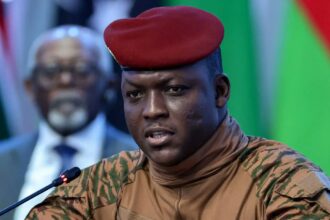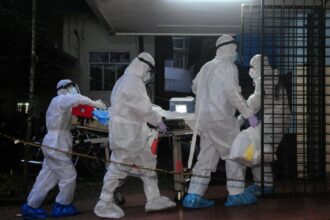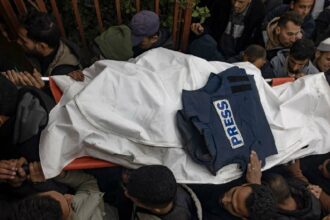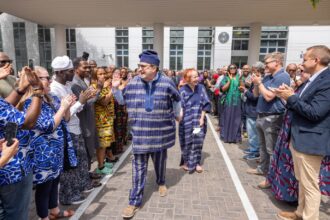
Rebel forces made a historic declaration on Sunday, December 8, announcing that Damascus, the capital city of Syria, had been “liberated” from government control.In a symbolic takeover, rebel fighters were seen occupying the grounds of the Syrian presidential palace on Sunday, marking a significant turning point in the conflict.
Footage circulating on social media platforms showed rebel fighters gathered near a gatehouse at the southern entrance of the palace grounds, firing their guns into the air in jubilation.The once-heavily fortified entrance area, now deserted and devoid of government presence, served as a backdrop for the rebels’ triumphant celebration.
“Damascus has been liberated and the tyrant Bashar al-Assad has been overthrown, and oppressed prisoners in regime prisons have been released,” a spokesperson said reading from a statement surrounded by roughly a dozen other rebels.
“We ask people and fighters to protect all property in Free Syria…long live Syria free for all Syrians of all sects,” he added.
Rebel forces seized control of state media offices in Damascus early Sunday morning, marking a significant milestone in their campaign against the Syrian government. The Syrian civil war, which began in 2011, has been a complex and multifaceted conflict involving various state-sponsored and non-state actors.
The conflict erupted in March 2011, when widespread protests and pro-democracy rallies broke out across Syria, inspired by the Arab Spring movement. The government’s brutal crackdown on dissent led to the formation of armed rebel groups, including the Free Syrian Army, which marked the beginning of the Syrian insurgency.
By mid-2012, the insurgency had escalated into a full-blown civil war, with rebel forces receiving support from NATO and Gulf Cooperation Council states, while government forces received backing from Iran and Russia. The rebels made significant gains, capturing key cities like Raqqa in 2013 and Idlib in 2015.
However, Iran and Russia’s military interventions in 2014 and 2015 shifted the balance of the conflict in favor of the government. The recent Russian war on Ukraine and Israel’s attacks on Hezbollah, Hamas, and Iran’s military apparatus created an opportunity for the rebels to launch a surprise attack on government forces.
As of Sunday morning, President Bashar al-Assad’s whereabouts were unknown, with reports suggesting he had fled to a secret location. Rebels were questioning Syrian military officers and intelligence officials to gather information about his movements. The Syrian leader has not made any public appearances or statements since the rebels entered Damascus.
Syrian Prime Minister Mohammad Ghazi al-Jalali issued a statement saying the government was ready to cooperate with any leadership chosen by the people. The situation in Syria remains fluid, with the rebels’ next moves and the government’s response yet to be seen.“We are ready to cooperate with any leadership the people choose, offering all possible support to ensure a smooth and systematic transition of government functions, preserving state facilities,” he said.
Syrian Prime Minister Ghazi al-Jalali urged citizens to safeguard public facilities, emphasizing their collective ownership. “I am here in my home, did not leave and do not intend to leave it except in a peaceful manner to ensure the continuing operation of public institutions, state facilities, and to broadcast safety and security for all citizens.”
“We extend our hands to every Syrian citizen who is concerned about safeguarding this nation’s assets… I urge all citizens not to harm any public property because, ultimately, it belongs to them.”
Meanwhile, the leader of Hayat Tahrir Al-Sham (HTS), the primary force behind Syria’s armed opposition, instructed rebel forces to spare state institutions from damage.
“To all military forces in the city of Damascus, it is strictly forbidden to approach public institutions, which will remain under the supervision of the former Prime Minister until they are officially handed over, and it is also forbidden to fire bullets into the air,” Ahmed al-Sharaa, also known as Abu Mohammad al-Jolani, wrote on telegram.
In a recent CNN interview, HTS leader Abu Mohammad al-Jolani, who introduced himself as Ahmed al-Sharaa, presented a new vision for the war-torn nation. This rebranding effort comes as rebels make significant gains, capturing key cities and pushing toward Damascus.
Source: https://www.lindaikejisblog.com








